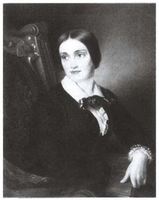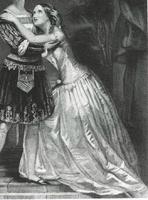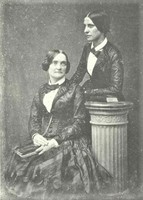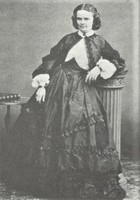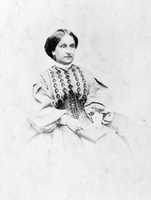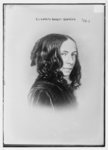Letter from Elizabeth Barret Browning to Isa Blagden, [April 15, 1859]
Dublin Core
Title
Subject
Description
Browning tells Blagden of a conversation she overheard "through a half-open door," in which Cushman spoke highly of Isa Blagden. Recently, Cushman is troubled due to her own health issues, the illness of her sister Susan, and a miscommunication caused by Harriet Hosmer that prevented a meeting between Blagden and Cushman.
Further, Browning talks about Rome, Matilda Hays and her English Women's Journal, and the Italian war of independence.
Credit
The Brownings CorrespondenceCreator
Source
Publisher
Date
Type
Letter Item Type Metadata
Text
Ever dearest Isa,
I have your letter with the Fauveau enclosure, which is very satisfactory, & characteristic besides. The last letter of yours too, I have received—& how welcome it is. So pleasant, to see the date … Villa Bricchieri. Florence would be deflowered without you– As well as Giotto’s tower!
And now I am forced to say what will grieve you if you have not heard of it before. You have at least heard how ill poor Una Hawthorne has been from Roman fever, off & on, ever since she came .. that is, for some six months, in the course of which she has had one attack after another in the Roman fever way– Well, at last, comes the worst attack of all, complicated with gastric, .. keeps her in bed a fortnight very ill,—at the end of which time comes Franco in a state of distraction to her family, to say that all hope of saving her is over, except by a miracle. The desease, which is apt in its protracted stages to fall on a vital organ, has siezed the lungs, .. & in the course of three days, said he, the work of three years phthisis was worked. Before the fourteenth of this month, she would be gone–! So shocked all Rome has been, & I certainly not least. I went myself at once to try to persuade Mrs Hawthorne to be led no more by Franco but to call in other advice.You never saw a woman more possessed by man or devil!–She had “had Franco for six months” (what a reason!) & would have him still. Mr Hawthorne had no faith in Franco,—but then, said he, he had no faith in any one else—so he would not “vex Sophia” who was happy enough to have so much. We all could only sigh & groan. Some of the final symptoms appeared, we heard, & expected the worst every hour—but within the last two days she appears a shade better .. not worse .. at least—& I have just heard from Miss Shepard that the heads of the house had been prevailed on to have another opinion .. a Dr Ledesles’s (homœopathic still!) & that though she had had no private conversation with him, her impression was that his view was more cheering than Franco’s. I shall let you know, if there is a change one way or another. Such a lovely girl! She called here just before this last attack. With all my belief in homœpathy for chronic maladies, you know what I think of it for matters of active fever. And as to Franco, no form of scepticism sufficiently expresses my distrust in him.
Miss Cushman also has had a slight attack of Roman fever, which, together with a telegram from Liverpool apprizing her of her sister’s dangerous illness, made her look wretchedly ill when I saw her last. She could not go, she was so ill—& now there is an improved account of the sister, which will admit of her staying. I wish you could have heard through a half-open door all the good she said of you, my Isa. And she is vexed about you, too– She thinks you may or must see her under a cloud just now, because of the invitation to her house .. which you heard of & never received. The fact was, that the bedroom (to be offered) was not hers but Hatty’s. Therefore Hatty was entreated to write the invitation, .. & I think Miss C. was under the impression that it had been sent– Hatty had promised to write instantly. Miss Cushman was very vexed to find that the whole subject had been ignored after all, & that Hatty had confined herself to proposing to go to you!– The meaning of which was, of course, that she had heard from me of your decision to remain in Florence this spring–
Still, Miss Cushman repeats quite with pain– “But what can she think of me? Hatty has ruined me with her–”
I can answer to you for one thing—that Miss Cushman has much admiring esteem for you, & speaks of you with apparently the most cordial affection–
Bessie Parkes arrived here, looking a great deal the paler & thinner for her illness– I have seen her only once, & we did not speak of Miss Hays– Of whom however, I did speak to Mrs Bridell,—& I will tell you that quite plainly Mrs Bridell does not like her—said, in fact, she distrusted her, but admitted that she did so rather instinctively than by the shadow of a reason– Miss Hay[s] rents an apartment in Mr Fox’s house—it is simply that; & Mrs Bridell smiled a little at the fanaticism of the groups of friends who were drawn to her there,—observing that her father (not a good judge of character, said she) did not escape being a little enchanted– On the other hand, Mr Fox’s advice was found useful, of course, in matters connected with the ‘Journal’. That’s all I can tell you of Miss Hays.
But, talking of the Journal, I have read ‘Success & Failure,’ & dearest Isa, it is success– Very cleverly done—& your progress in expression & style .. savoir faire altogether .. most striking. Let me confess– Consciously or unconsciously your Arthur is too like your Lytton, I think: no one could mistake it, Isa—and from henceforth you must avoid this shoal of Lytton, & keep more out at sea, for art’s sake– Otherwise, I should really grudge these chapters to the “Englishwoman”—they are too good for any such purpose– Isa, I tell you, not as a friend but as an enemy (if I can fancy myself into such an unnatural relation to you!) .. you can write a novel– Now, set about, & write it,—because you can, and I would not say so with ever so much love, without a conviction.
Dear, I am delighted & flattered that you like Talfourd’s portrait—only I wish you had seen your own copy first, which we have for you here. Mr Leighton has just made a highly finished pencil drawing of me, which brings me down to the earth again with a frightful extinguishment of all self-satisfaction– Fat & comfortable, old more than enough, & even more “hardness” than you would think necessary. The worst is that it is exquisitely drawn & finished– He makes amends too by having produced an admirable portrait of Robert (‘companion’ .. alas!) under his common-place aspect. Meanwhile Talfourd is at work on Robert,—& he always siezes the poetical side, where there is one– I trust Talfourd–
Miss Parkes has been here, & is to come again with an enclosure for you– Her friend, Miss Mereweather, has had a touch of Roman fever, & they are both at Frascate in-consequence, coming in to Rome everyday. A city of the plague, after all Isa—though we of this household are so well,—Peni is red as a rose, & Robert obliged to enlarge the frontiers of his nether garments through the expansion of the revolutionary body. But I dont go out to “dinner”—not I. Who told you?
Yes, I think much still of “the spirits”—though my mediums are shy & averse to be quoted. which seems to me unfortunate– But courage is difficult on this subject to any one who objects to being called dishonest; that alternative of being believed. At the same time, I myself have courage for so much,—while I have tolerance for others,—comprehending the unpleasantness of passions for either ‘mad’ or ‘bad’– Certainly not pleasant, Isa!– The spirits here let themselves be seen– (Not that I see them, observe–) Then there is a great deal of involuntary writing.
But I am much distracted from even this subject by the Italian question which has eaten into my <***>


